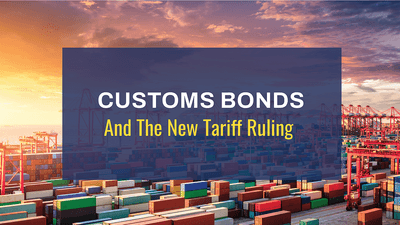October 25, 2017 | Industry Insights
Moving Targets: The Property Broker Benefits from Rail Deregulation – All Others Take Care

This blog written by Laura A. Otenti of Posternak Blankstein & Lund LLP examines how deregulation of the rail industry impacts the property broker bond required by the Federal Motor Carrier Safety Administration (FMCSA). Deregulation does not mean no regulation at all. The trick is figuring out which regulations remain in place and when.
FMCSA Property Broker Bond
Property brokers that operate in interstate commerce have to comply with the FMCSA’s financial security requirements. This means that the property broker has to post a bond (BMC-84) to ensure that motor carriers are paid for their services. When a broker hires a motor carrier to transport cargo and fails to pay the freight charges, the motor carrier has two options: (1) It can pursue the consignee for the freight charges or (2) it can submit a claim against the broker’s bond. Making a claim against a broker bond is relatively simple. The motor carrier fills out a claim form and submits the delivery receipts, bills of lading, invoices and other back-up documentation to the underwriter. The bond underwriter will decide whether the motor carrier’s claim is valid, and will pay the motor carrier, and any other motor carriers with claims against the property broker, from the bond. In other words, the FMCSA property broker bond provides a certain amount of protection to the motor carrier who elects to do business through a broker, and conversely imposes an economic burden on the broker to obtain a bond.
Intermodal Rail Exceptions
However, this is not the case if the goods are moving by intermodal rail. The Staggers Rail Act of 1980 substantially freed the rail industry from oversight by the Interstate Commerce Commission and its successor agency, the Surface Transportation Board. The Staggers Rail Act impacts property brokers and motor carriers because regulations under the Staggers Rail Act trump the requirements of the Motor Carrier Act of 1980, which itself rolled back regulation under the Interstate Commerce Act.
The Staggers Rail Act exempts almost all of the requirements of 49 U.S.C., Title IV. The exemption to the FMCSA broker bond requirement applies in two situations
(1) trailer on flat car (TOFC) and container on flat car (COFC) service provided by a rail carrier either by itself or jointly with a motor carrier as part of a continuous intermodal freight movement and (2) motor carrier TOFC/COFC pickup and delivery services arranged independently with the shipper or receiver (or its representative/agent) and performed immediately before or after a TOFC/COFC movement provided by a rail carrier.
For purposes of the exemption, TOFC/COFC service means the transportation by rail, in interstate or foreign commerce, of:
- Any freight-laden highway truck trailer, or semitrailer,
- The freight-laden container portion of any highway truck, trailer or semitrailer having a demountable chassis,
- Any freight-laden multimodal vehicle designed to operate both as a highway truck, trailer or semitrailer and as a rail car,
- Any freight-laden intermodal container comparable in dimensions to a highway truck, trailer, or semitrailer and designed to be transported by more than one mode of transportation or
- Any of the foregoing types of equipment when empty and being transported incidental to its previous or subsequent use in TOFC/COFC service.
The Other Side of the Coin

As a result of the Staggers Rail Act exemption, brokers who deal purely with intermodal rail shipments do not have to have an FMCSA bond. This is an economic benefit to the property broker. On the other hand, the motor carrier has greater risk because a motor carrier who transports containers and trailers that are part of a TOFC/COFC rail shipment cannot make a claim against a broker’s FMCSA bond to get paid. This is the case even if the motor carrier has been hired by the shipper or consignee to perform pickup or delivery services immediately before or after the rail movement. In other words, it makes no difference that the motor carrier was hired by the property broker, consignee or consignor for drayage to or from the railyard. The exemption does have limits. It does not apply to motor carrier service in which a rail carrier participates only as the motor carrier’s agent (Plan I TOFC/COFC).
Property Broker: Seek Help Through the Minefield
The immediate take away is that the economic risk allocation for payment of freight charges between a property broker and a motor carrier is reversed in the context of intermodal rail shipments. However, the bigger lesson is that this is just one instance where the interplay of deregulatory laws creates a minefield for logistics companies. Legal counsel and insurance providers offer valuable assistance in navigating this complicated legal terrain.
About Roanoke Insurance Group
Roanoke Insurance Group, a division of Roanoke Insurance Group Inc. and part of Munich Re Specialty Group Ltd., operates as a specialty insurance broker focused on surety and insurance solutions for transportation intermediaries, 3PLs, customs brokers and
companies with supply chains, and is a leading provider of customs bonds, marine cargo insurance and ATA Carnets for the industry. Contact us at 1.800.ROANOKE (800.762.6653) for more information to find out how we can serve your specific needs.
About the Author
Laura Otenti is a Partner in the firm’s Litigation, Logistics & Transportation, and Bankruptcy Departments. She is admitted in the state and federal courts of Massachusetts and Rhode Island, as well as the First Circuit Court of Appeals. Prior to joining the firm, Laura practiced in Rhode Island at a well-respected firm in Providence and for the Honorable Michael Silverstein of the Rhode Island Superior Court.













